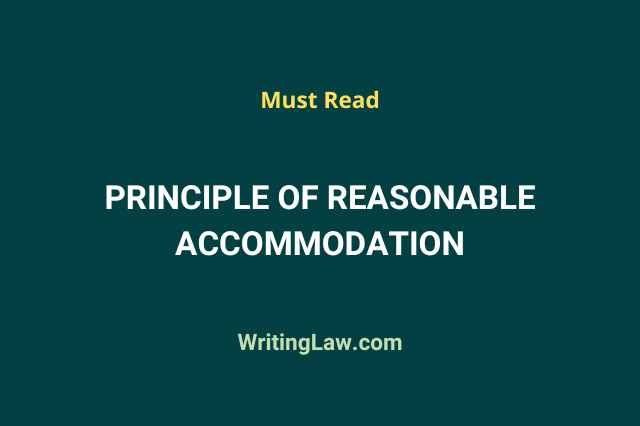
An ideal society is formed by the inclusion of all people, provided with a level playing field, with acceptance and confidence, with open-mindedness and a sense of groundedness (humbleness).
Promoting this idea of none discriminatory nature is the principle which has its rooted presence in Article 2 of the UN Convention on the Rights of Persons with Disabilities (UNCRPD), called the Principle of Reasonable Accommodation.
The detailed analysis of this principle, along with its recent citations in various important judgements, are presented in a simplified manner in this article.
What Is the Principle of Reasonable Accommodation?
The Principle of Reasonable Accommodation promotes equality of opportunity by making reasonable exceptions to certain people who lack a common privilege that a normal individual otherwise enjoys.
Article 2 of the UN Convention on the Rights of Persons with Disabilities defines Reasonable Accommodation as:
“Reasonable accommodation” means necessary and appropriate modification and adjustments, not imposing a disproportionate or undue burden, where needed in a particular case, to ensure to persons with disabilities the enjoyment or exercise on an equal basis with others of all human rights and fundamental freedom.”
This principle of Reasonable Accommodation is usually applied in cases of disability, health condition or personal belief.
In 2016, International Labour Organisation chose workers with disabilities, workers living with HIV and AIDS, workers holding particular religions or beliefs, and pregnant workers with family responsibilities to be included in the practical guide promoting diversity and inclusion through workplace adjustments.
The Philosophical Aspect of the Principle of Reasonable Accommodation
“A disability doesn’t have to be a social barrier. Good etiquette begins with inclusion, not exclusion.” – Robert M Hensel
In a world, where every human being is not born with all privileges, it becomes quintessential that some alternative is provided in the form of some solution which places every human being on an equal footing so that the human spirit is not defined and restrained by the things a human being lacks.
Equality of opportunity can only be provided when there is equality of basic privileges needed for seeking that opportunity and when there is the inclusion of specially-abled people through reasonable adjustments.
Recent Case Laws Citing the Principle of Reasonable Accommodation
The Rights of Persons with Disabilities Act, 2016 defines reasonable accommodation under section 2(y) as: “necessary and appropriate modification and adjustments, without imposing a disproportionate or undue burden in a particular case, to ensure to persons with disabilities the enjoyment or exercise of rights equally with others.”
This principle has been cited in various recent judgements like:
Smt Reshma vs the State of Karnataka (2021) (popularly known as Hijab ban case), where Karnataka High Court chose reasonable restriction above reasonable accommodation, citing that ban on hijab in educational institutions is a reasonable restriction.
Vikas Kumar vs UPSC (2021), in which the Supreme Court elaborated the principle of reasonable restriction, saying that failure to provide a scribe to a person with a 40% benchmark disability is against the Principle of Reasonable Accommodation, thus leading to discrimination.
Jeeja Ghosh and Anr vs Union of India and Ors (2016), in which the Supreme Court awarded a compensation of 10 lakh rupees to a person suffering with cerebral palsy who was evicted from a flight after boarding.
Conclusion
“Disability need not be an obstacle to success.” – Stephen Hawking
The principle of Reasonable Accommodation promotes the basic ideal of equality irrespective of the physical condition of a person by providing certain extra privileges to people who lack the required necessity for reaping any opportunity with equal physical placement. This principle thus removes any form of quixotic (impractical) fantasies of the idea of equality engrained in the privileged minds.
- Meaning of Substantive Law and Procedural or Adjective Law - 19th March 2023
- What Are the Changes Made By the Medical Termination of Pregnancy Amendment Act of 2021? - 19th March 2023
- What Are the Changes Proposed by Draft Indian Telecommunication Bill, 2022? - 19th March 2023







